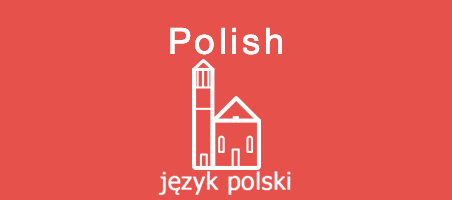Learn to Speak Polish
Polish (język polski, polszczyzna) is a language of the Lechitic subgroup of West Slavic languages, used throughout Poland (being that country’s official language) and by Polish minorities in other countries. Its written standard is the Polish alphabet, which has several additions to the letters of the basic Latin script.

Learn Polish with Language Door Today!
Language Door’s expert teachers offer instruction for students of all ages. We keep our tuition prices low but offer quality instruction in a pleasant environment. Our class size is always a small group. Our teachers are native speakers and offer the hands on training that will enhance your learning experience.
Interesting Facts About Poland And The Polish Language
The name Poland is believed to come from the West Slavic tribe of the Polans or Polanie. The Polish word pole means field which aptly describes most of the lowlands and low hills that dominate the landscape.
Geographically, Poland is not in eastern Europe but rather the very center of Europe.
Polish is the 29th most spoken language in the world, and is one of the most widely spoken Slavic languages.
Polish is closely related to Kashubian, Lower Sorbian, Upper Sorbian, Czech and Slovak.

Where Is Polish Spoken?
There are about 40 million speakers mainly in Poland. There are also significant Polish communities in Lithuania, Belarus and Ukraine, and significant numbers of Polish speakers in many other countries, including the Czech Republic, Germany, Slovakia, Latvia, Romania, the UK and USA.
Origins Of The Polish Language
Its Ancient Origins The originality of Polish culture is tied to its language and to its Slavonic roots. Linguistic studies indicate that 5000 to 4000 years ago early Balto-Slavic languages were part of the Arian or the Eastern Indo-European languages. Over 3500 years ago, the languages of the Balto-Slavs separated from the Arian languages; some 3000 years ago, the Baltic and Slavic languages separated from each other; and for the next 1500 years, the Slavic languages evolved parallel to the Greek, Latin, Celtic, Germanic, and other languages. The evolution of the Polish language occurred during the following 1500 years.
Despite the pressure of non-Polish administrations in Poland (during the 19th and early 20th centuries) resulting from Partitions of Poland, who often attempted to suppress the Polish language, a rich literature has developed over the centuries, and the language is currently the largest, in terms of speakers, of the West Slavic group. It is also the second most widely spoken Slavic language, after Russian and ahead of Ukrainian.

